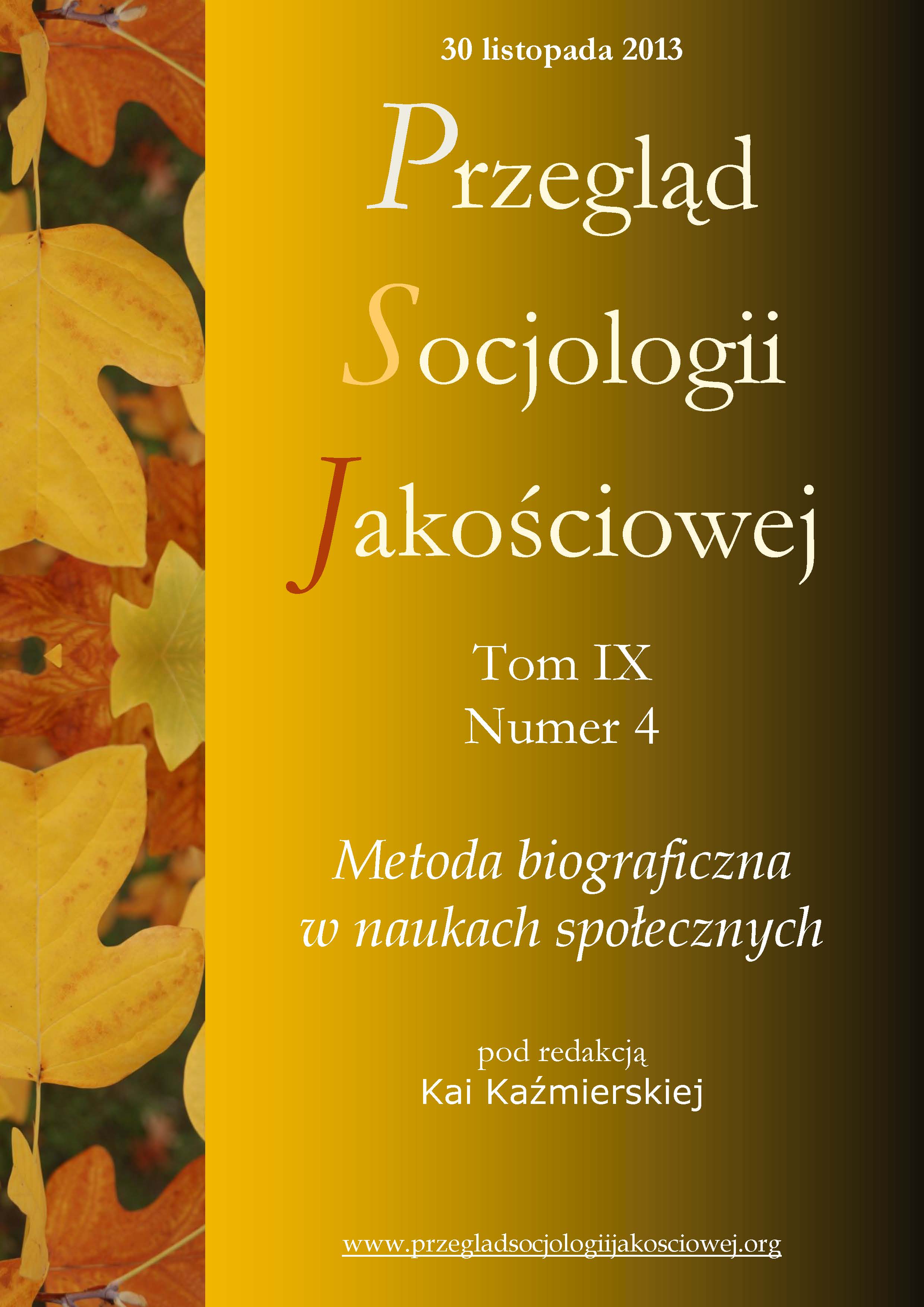Interpretive Sociology and Biographical Method: Change of Function, Anti-Essentialist Reservations and the Problem of Critique
DOI:
https://doi.org/10.18778/1733-8069.9.4.02Keywords:
interpretive sociology, biographical method, change of function, governmentality, anti-essentialism, critiqueAbstract
The article offers an introduction to a discussion on the epistemological and axiological assumptions of the biographical methods and, more broadly, interpretive sociology. It first presents the changes in the function (Funktionswandel, in the terminology of Karl Mannheim) of interpretive concepts as they entered mainstream sociology in recent decades: from the critique of disciplinary power (in the Foucauldian sense) to the lack of criticism towards governmentality. It is in this context that the position of the biographical method is discussed. Reservations towards the biographical method are then outlined from the points of view of two varieties of anti-essentialism (Erving Goffman, Michel Foucault). The conclusion postulates that interpretative sociology and the biographical method will once again takeup a critical attitude, this time with regard to governmentality.
Downloads
References
Alexander Jeffrey C. (1982) Theoretical Logic in Sociology, vol. 1: Positivism, Presuppositions, and Current Controversies. London: Routledge and Kegan Paul.
Google Scholar
Bührmann Andrea D., Ernst Stefanie, eds. (2010) Care or Control of the Self? Norbert Elias, Michel Foucault, and the Subject in the 21st Century. Newcastle upon Tyne: Cambridge Scholars Publishing.
Google Scholar
Cicourel Aaron V. (1968) The Social Organization of Juvenile Justice. New York: Wiley.
Google Scholar
DOI: https://doi.org/10.2307/1141851
Czyżewski Marek (2003) Reflexivity of actors vs. reflexivity of accounts [w:] Michael Lynch, Wes Sharrock, eds., Harold Garfinkel, vol. 1. London: Sage, s. 227–233.
Google Scholar
Czyżewski Marek (2009) Między panoptyzmem i „rządomyślnością” – uwagi o kulturze naszych czasów. „Kultura Współczesna”, t. 2, s. 83–95.
Google Scholar
Czyżewski Marek (2012) Dyskursy tożsamościowe w nauce i życiu społecznym: odmiany, własności, funkcje [w:] Renata Dopierała, Kaja Kaźmierska, red., Tożsamość, nowoczesność, stereotypy. Księga Jubileuszowa poświęcona Profesorowi Zbigniewowi Bokszańskiemu. Kraków: Nomos, s. 101–120.
Google Scholar
Czyżewski Marek (2013) Teorie dyskursu i dyskursy teorii. „Kultura i Społeczeństwo”, nr 2, s. 3–25.
Google Scholar
Czyżewski Marek, Marynowicz-Hetka Ewa, Woroniecka Grażyna, red., (2013) Pedagogizacja życia społecznego. „Societas/Communitas”, 2 (16).
Google Scholar
Foucault Michel (1992) Was ist Kritik? Berlin: Merve.
Google Scholar
Foucault Michel (1996) Diskurs und Wahrheit. Berkeley Lectures 1983. Berlin: Merve.
Google Scholar
Foucault Michel (2000) Historia seksualności. Przełożyli Bogdan Banasiak, Tadeusz Komendant i Krzysztof Matuszewski. Warszawa: Czytelnik.
Google Scholar
Foucault Michel (2002) Porządek dyskursu. Przełożył Michał Kozłowski. Gdańsk: słowo/obraz terytoria.
Google Scholar
Foucault Michel (2003) Słowa i rzeczy. Archeologia nauk humanistycznych. Tom 2. Przełożył Tadeusz Komendant. Gdańsk: słowo/obraz terytoria.
Google Scholar
Foucault Michel (2005) Technologien des Selbst [w:] tegoż, Schriften IV. 1980-1988. Frankfurt n. Menem: Suhrkamp, s. 966–999.
Google Scholar
Foucault Michel (2010) Bezpieczeństwo, terytorium, populacja. Wykłady w Collège de France 1977–1978. Przełożył Michał Herer. Warszawa: Wydawnictwo Naukowe PWN.
Google Scholar
Foucault Michel (2011) Narodziny biopolityki. Wykłady w Collège de France 1978–1979. Przełożył Michał Herer. Warszawa: Wydawnictwo Naukowe PWN.
Google Scholar
Garfinkel Harold (1967) Studies in Ethnomethodology. Englewood Cliffs: Prentice Hall.
Google Scholar
Garfinkel Harold (2007) Studia z etnometodologii. Przełożyła Alina Szulżycka. Warszawa: Wydawnictwo Naukowe PWN.
Google Scholar
Giddens Anthony (1984) The Constitution of Society. Outline of the Theory of Structuration. Cambridge: Polity Press.
Google Scholar
Giddens Anthony (2003) Stanowienie społeczeństwa. Zarys teorii strukturacji. Przełożył Stefan Amsterdamski. Poznań: Zysk i S-ka.
Google Scholar
Goffman Erving (1961) Asylums. Essays on the Social Situation of Mental Patients and Other Inmates. New York: Doubleday Anchor.
Google Scholar
Goffman Erving (2010) Analiza ramowa. Esej z organizacji doświadczenia. Przełożył Stanisław Burdziej. Kraków: Nomos.
Google Scholar
Goffman Erving (2011) Instytucje totalne. O pacjentach psychiatrycznych i mieszkańcach innych instytucji totalnych. Przełożyli Olena Waśkiewicz i Jacek Łaszcz. Gdańsk: Gdańskie Wydawnictwo Psychologiczne.
Google Scholar
Lévinas Emmanuel (1998) Całość i nieskończoność. Esej o zewnętrzności. Przełożyła Małgorzata Kowalska. Warszawa: Wydawnictwo Naukowe PWN.
Google Scholar
Lukács György (1988) Zmiana funkcji materializmu historycznego (1919) [w:] tegoż, Historia i świadomość klasowa. Studia o marksistowskiej dialektyce. Przełożył Kazimierz Ślęczka. Warszawa: PWN, s. 418–469.
Google Scholar
Mannheim Karl (1964) Das Problem einer Soziologie des Wissens (1925) [w:] Kurt H. Wolff, Hrsg., Wissenssoziologie. Berlin: Luchterhand, s. 308–387.
Google Scholar
Riemann Gerhard, Schütze Fritz (2012) „Trajektoria” jako podstawowa koncepcja teoretyczna w analizach cierpienia i bezładnych procesów społecznych [ w:] Kaja Kaźmierska, r ed., Metoda biograficzna w socjologii. Przełożyli Zbigniew Bokszański i Andrzej Piotrowski. Kraków: Nomos, s. 389–414.
Google Scholar
Rose Nikolas (1996) Identity, Genealogy, History [w:] Stuart Hall, Paul du Gay, eds., Questions of Cultural Identity. London: Sage, s. 128–150.
Google Scholar
DOI: https://doi.org/10.4135/9781446221907.n8
Rose Nikolas (1999) Powers of Freedom: Reframing Political Thought. Cambridge: Cambridge University Press.
Google Scholar
DOI: https://doi.org/10.1017/CBO9780511488856
Schütze Fritz (2012) Trajektorie cierpienia jako przedmiot badań socjologii interpretatywnej. [w:] Kaja Kaźmierska, red., Metoda biograficzna w socjologii. Przełożył Marek Czyżewski. Kraków: Nomos, s. 415–458.
Google Scholar
Sztompka Piotr (2002) Socjologia. Analiza społeczeństwa. Kraków: Znak.
Google Scholar
Wieder Lawrence D. (1974) Language and Social Reality. The Case of Telling the Code. The Hague: Mouton.
Google Scholar
DOI: https://doi.org/10.1515/9783111410999
Downloads
Published
How to Cite
Issue
Section
License

This work is licensed under a Creative Commons Attribution-NonCommercial-NoDerivatives 4.0 International License.














